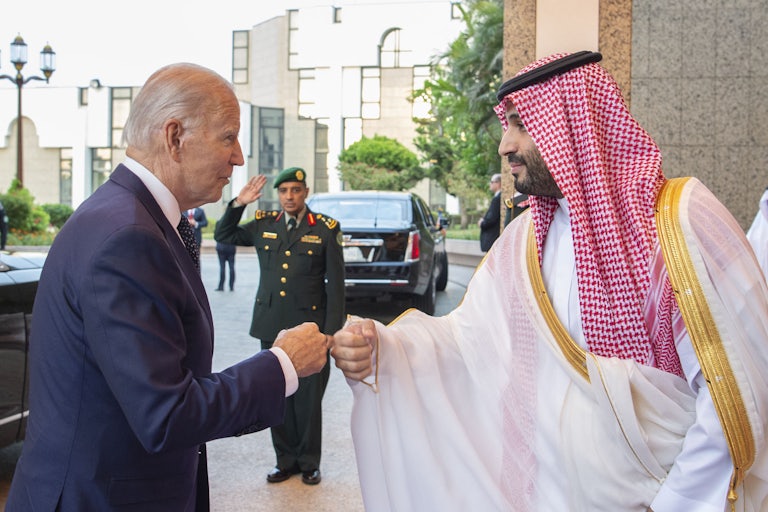Joe Biden Unveils The Ambitious US-Backed Transport Corridor Linking India to Europe via the Middle East
US President Joe Biden has unveiled a visionary plan; the proposed project aims to construct a vast rail and shipping corridor that would physically and digitally link India to Europe, spanning the Middle East. This initiative not only promises to enhance economic growth but also foster deeper political cooperation among nations. The announcement was made during the annual Group of 20 summit by Biden, Indian Prime Minister Narendra Modi, and European Commission President Ursula von der Leyen as part of the Partnership for Global Infrastructure Investment initiative.

US President Joe Biden, on Saturday, unveiled an ambitious plan to construct a transportation corridor with US support, connecting India to the Middle East and Europe; the project aims to promote economic growth and foster political cooperation on a global scale.
US President Joe Biden expressed the significance of this endeavour, emphasizing its transformative potential for trade, energy resources, and digital connectivity.
The proposed corridor involves a coalition of nations, including India, Saudi Arabia, the United Arab Emirates, Jordan, Israel, and the European Union.

The announcement was made during the annual Group of 20 summit by Biden, Indian Prime Minister Narendra Modi, and European Commission President Ursula von der Leyen as part of the Partnership for Global Infrastructure Investment initiative.
“We think that the project itself is bold and transformative, but the vision behind the project is equally bold and transformative, and we will see it replicated in other parts of the world as well,” Sullivan said.
This rail and shipping corridor aims to physically and digitally connect vast regions, facilitating increased trade and the transportation of energy resources, notably hydrogen.
Although White House officials did not set a timeline for its completion, this project also presents an alternative to China’s extensive infrastructure program, although specific funding details remain undisclosed.
The White House gave no details on how the project would be paid for.
Prime Minister Benjamin Netanyahu has previously discussed the possibility of a train linking Israel to Saudi Arabia.
Sullivan said the network reflected Biden’s vision for “far-reaching investments” that come from “effective American leadership” and a willingness to embrace other nations as partners.

He said the enhanced infrastructure would boost economic growth, help bring countries in the Middle East together and establish that region as a hub for economic activity instead of as a “source of challenge, conflict or crisis” as it has been in recent history.
However, the White House clarifies that this initiative is not a precursor to normalization but underscores Israel’s significant role in the endeavor.
Von der Leyen characterized the project as a “green and digital bridge across continents and civilizations” and highlighted its inclusion of electricity and data transmission cables.
In addition to this initiative, a “Trans-African Corridor” connecting Angola’s port of Lobito to landlocked regions in the Democratic Republic of Congo and Zambia was announced, marking a substantial regional investment.
The project’s timeline envisions the formation of working groups in the next 60 days to develop comprehensive plans and set deadlines. The first phase will identify areas requiring investment and physical infrastructure connection. Over the next year, these plans will progress to financial arrangements and construction.

This project began taking shape following Biden’s visit to Jeddah, Saudi Arabia, in July 2022, emphasizing the need for regional economic integration. Conversations with regional partners commenced in January, with mapping and assessments of existing rail infrastructure in the Middle East beginning in the spring. White House officials further engaged with counterparts from India, Saudi Arabia, and the UAE during a visit to Saudi Arabia in May.
While Saudi Arabia and Israel do not have diplomatic relations, the transportation project emphasizes practical outcomes, with Israel’s inclusion being of paramount importance to the participating countries due to geographical considerations.
During the G20 summit, Biden addressed various global issues, including climate change and the impact of Russia’s war in Ukraine on international
economies. Notably, Ukraine President Volodymyr Zelensky was not invited to this year’s gathering, although the White House advocated for his inclusion.
The summit’s joint statement reaffirmed principles against the use of force to change borders, nuclear disarmament, and the pursuit of a just peace based on UN Charter principles. It also stressed the need to cease attacks on civilian infrastructure.
Biden also discussed his request for additional funding for the World Bank with Congress, aiming to generate over $25 billion in new lending for economic development.
In a broader context, the White House seeks to strengthen the G20 as an international forum, even as Chinese President Xi Jinping and Russian President Vladimir Putin chose not to attend. Biden expressed disappointment over Xi’s absence but maintained that the summit was proceeding well.
The Last Bit, President Biden’s unveiling of the US-backed transport corridor project represents a bold step towards global connectivity and cooperation. This visionary initiative promises to enhance trade, facilitate the movement of energy resources, and improve digital connectivity on an unprecedented scale.
While still in its nascent stages, this project carries the potential to reshape international dynamics and challenge existing paradigms, particularly in the context of China’s infrastructure initiatives.






